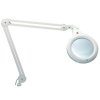I've tried all kinds of magnifiers with all kinds of different magnifications. Although they seem to work well for some people, none worked well for me, mostly because at a magnification I could actually see what I wanted to see I had problems focusing. Unfortunately magnification also magnifies movement.
About the only thing I haven't tried, without getting into hundreds or thousands of dollars, is a USB microscope. I may buy one someday but don't have that much interest in it right now. I agree with smaug above, that the proof of a knife's sharpness is in its performance, and I also agree with his book recommendation.

